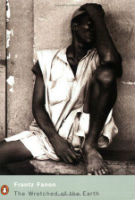 A distinguished psychiatrist from Martinique who took part in the Algerian Nationalist Movement, Frantz Fanon was one of the most important theorists of revolutionary struggle, colonialism, and racial difference in history. Fanon’s seminal work on the trauma of colonization, The Wretched of the Earth (Les Damnés de la Terre), made him the leading anti-colonialist thinker of the twentieth century.
A distinguished psychiatrist from Martinique who took part in the Algerian Nationalist Movement, Frantz Fanon was one of the most important theorists of revolutionary struggle, colonialism, and racial difference in history. Fanon’s seminal work on the trauma of colonization, The Wretched of the Earth (Les Damnés de la Terre), made him the leading anti-colonialist thinker of the twentieth century.
Written at the height of the Algerian war for independence from French colonial rule and first published in 1961, Frantz Fanon’s classic text has provided inspiration for anti-colonial movements ever since. With power and rage, Fanon makes clear the economic and psychological degradation inflicted by imperialism.
The Wretched of the Earth is a brilliant analysis of the psychology of the colonized and their path to liberation. Bearing singular insight into the rage and frustration of colonized peoples, and the role of violence in effecting historical change, the book incisively attacks the twin perils of postindependence colonial politics: the disenfranchisement of the masses by the elites on the one hand, and intertribal and interfaith animosities on the other. Fanon’s analysis, a veritable handbook of social reorganization for leaders of emerging nations, has been reflected all too clearly in the corruption and violence that has plagued present-day Africa. The Wretched of the Earth has had a major impact on civil rights, anticolonialism, and black consciousness movements around the world.
Fanon’s masterwork is a classic alongside The Autobiography of Malcolm X.
Praise for The Wretched of the Earth
“In clear language, in words that can only have been written in the cool heat of rage, he showed us the internal theatre of racism.” –Independent
“The writing of Malcolm X or Eldridge Cleaver or Amiri Baraka or the Black Panther leaders reveals how profoundly they have been moved by the thoughts of Frantz Fanon.” –The Boston Globe
“Have the courage to read this book.” –Jean-Paul Sartre
“This century’s most compelling theorist of racism and colonialism.” –Angela Davis
“The value of The Wretched of the Earth [lies] in its relation to direct experience, in the perspective of the Algerian revolution. . . . Fanon forces his readers to see the Algerian revolution—and by analogy other contemporary revolutions—from the viewpoint of the rebels.” –Conor Cruise O’Brien, Nation
“The Wretched of the Earth is an explosion.” –Emile Capouya, Saturday Review
“This is not so much a book as a rock thrown through the window of the West. It is the Communist Manifesto or the Mein Kampf of the anticolonial revolution, and as such it is highly important for any Western reader who wants to understand the emotional force behind that revolution.” –Time
Quotes from The Wretched of the Earth
“Each generation must discover its mission, fulfill it or betray it, in relative opacity.”
“…change does not mean reform…change does not mean improvement.”
“The unpreparedness of the educated classes, the lack of practical links between them and the mass of the people, their laziness, and, let it be said, their cowardice at the decisive moment of the struggle will give rise to tragic mishaps.”
“For a colonized people the most essential value, because the most concrete, is first and foremost the land: the land which will bring them bread and, above all, dignity.”
“The basic confrontation which seemed to be colonialism versus anti-colonialism, indeed capitalism versus socialism, is already losing its importance. What matters today, the issue which blocks the horizon, is the need for a redistribution of wealth. Humanity will have to address this question, no matter how devastating the consequences may be.”
“The claim to a national culture in the past does not only rehabilitate that nation and serve as a justification for the hope of a future national culture. In the sphere of psycho-affective equilibrium it is responsible for an important change in the native. Perhaps we haven’t sufficiently demonstrated that colonialism is not satisfied merely with holding a people in its grip and emptying the native’s brain of all form and content. By a kind of perverted logic, it turns to the past of the oppressed people, and distorts, disfigures, and destroys it. This work of devaluing pre-colonial history takes on a dialectical significance today.”
“Taking the continent as a whole, this religious tension may be responsible for the revival of the commonest racial feeling. Africa is divided into Black and White, and the names that are substituted- Africa south of the Sahara, Africa north of the Sahara- do not manage to hide this latent racism. Here, it is affirmed that White Africa has a thousand-year-old tradition of culture; that she is Mediterranean, that she is a continuation of Europe and that she shares in Graeco-Latin civilization. Black Africa is looked on as a region that is inert, brutal, uncivilized – in a word, savage.”
“The missionaries find it opportune to remind the masses that long before the advent of European colonialism the great African empires were disrupted by the Arab invasion. There is no hesitation in saying that it was the Arab occupation which paved the way for European colonialism; Arab imperialism commonly spoken of, and the cultural imperialism of Islam is condemned.”
“Colonialism hardly ever exploits the whole of a country. It contents itself with bringing to light the natrual resources, which it extracts, and exports to meet the needs of the mother country’s industries, thereby allowing certain sectors of the colony to become relatively rich. But the rest of the colony follows its path of under-development and poverty, or at all events sinks into it more deeply.”
READ The Wretched of the Earth online, here.
Submit your review | |


